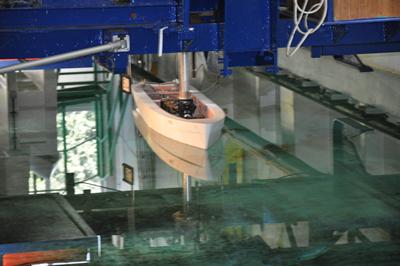What does the future of shipping look like?
At a time of rising fossil fuel prices and the global challenge of reducing greenhouse gas emissions, our researchers began working with B9 Shipping and off-the-shelf Rolls-Royce technology, to develop the modern world’s first 100 per cent fossil fuel-free cargo ships. Powered by soft sails and biogas from anaerobic digestion, the ships will optimise naturally available resources to provide efficient and affordable low-carbon shipping.

B9 Shipping, part of the B9 Energy group of companies, are developing the ships and have started work on a full-scale demonstration vessel validating the engineering and economic assumptions of the initial vessel design. The initial design featured a 100 metre, 3000 ton cargo carrier with three masts each rising 55 metres which is the equivalent of a 14-storey building.
Researchers from the University of Southampton’s Wolfson Unit for Marine Technology and Industrial Aerodynamics (WUMTIA) have been working in collaboration with B9 Shipping to provide fundamental testing using towing tank and wind tunnel research.
WUMTIA have been providing innovative marine technology and industrial aerodynamics expertise to a global customer base for over 40 years, and the Unit have long standing associations with the industry. Speaking in 2012 about the partnership between the University and B9 Shipping, Diane Gilpin, leader of the project, expressed her belief that “this collaboration [would] enable a robust, commercially and technically viable solution to be ready for scale once the engineering is proven”.
The testing programme began in June 2012 and involved towing tank and wind tunnel research to identify a basic hull design and its interaction with the dyna-rig sail system. The function of the programme was to examine various options for the performance parameters of a B9 ship with a scale model, calibrating the thrust from the sailing rig with various hull shapes to secure optimum performance efficiencies over a wide range of meteorological and sea conditions, whilst delivering against the essential commercial (loading and discharge; port constraints) aspects.
The long term aim of the project is to combine proven technologies in an innovative way that will lead to the development of ‘ready-to-go’, future-proof cargo ships. In the face of an urgent need and an ever evolving global problem, our researchers are creating viable solutions and actively changing the future of shipping.